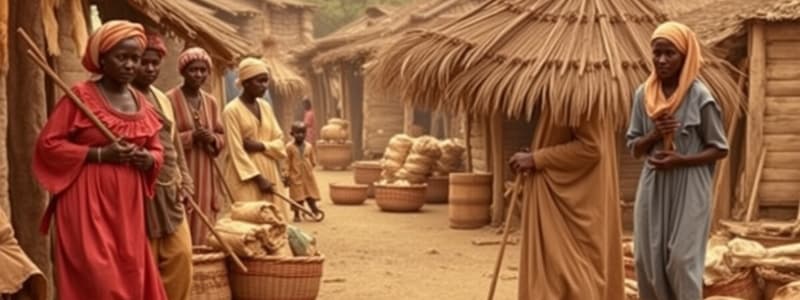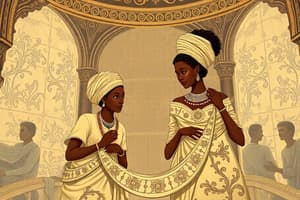Podcast
Questions and Answers
What were the key ethnic groups involved in post-independence tensions in Nigeria?
What were the key ethnic groups involved in post-independence tensions in Nigeria?
- Ijaw, Nimbia, and Ngwa
- Fulani, Berom, and Efik
- Igbo, Hausa-Fulani, and Yoruba (correct)
- Ibo, Kanuri, and Tiv
What was one of the main causes of the Biafran War in Nigeria?
What was one of the main causes of the Biafran War in Nigeria?
- Ethnic tensions and economic disparities (correct)
- Colonial legacy in governance
- Cultural assimilation issues
- Regional trade agreements
Which event marked the significant shift to civilian rule in Nigeria?
Which event marked the significant shift to civilian rule in Nigeria?
- Biafran War
- Return to civilian rule in 1999 (correct)
- Military coup of 1983
- Colonial independence in 1960
What ongoing governance challenge continues to affect Nigeria post-independence?
What ongoing governance challenge continues to affect Nigeria post-independence?
What conflict in Nigeria is especially tied to resource control in the Niger Delta region?
What conflict in Nigeria is especially tied to resource control in the Niger Delta region?
Which period marked the beginning of British colonization in Nigeria?
Which period marked the beginning of British colonization in Nigeria?
What was one of the significant effects of colonial economic policies in Nigeria?
What was one of the significant effects of colonial economic policies in Nigeria?
Who was a prominent figure advocating for Nigeria's self-governance during the independence movement?
Who was a prominent figure advocating for Nigeria's self-governance during the independence movement?
The establishment of trade routes in pre-colonial Nigeria primarily involved which of the following goods?
The establishment of trade routes in pre-colonial Nigeria primarily involved which of the following goods?
Which constitutional changes occurred in Nigeria during the independence movement?
Which constitutional changes occurred in Nigeria during the independence movement?
What role did Christian missionaries play in the context of colonial Nigeria?
What role did Christian missionaries play in the context of colonial Nigeria?
What was a characteristic of pre-colonial Nigerian political structures?
What was a characteristic of pre-colonial Nigerian political structures?
What was one of the primary motivations for the development of infrastructure during British colonization?
What was one of the primary motivations for the development of infrastructure during British colonization?
Flashcards are hidden until you start studying
Study Notes
Pre-colonial Societies
- Diverse Kingdoms: Nigeria was home to various kingdoms and cultures, including the Hausa city-states, the Yoruba city-states, and the Kingdom of Benin.
- Trade Networks: Established trade routes facilitated commerce across West Africa, involving goods like kola nuts, textiles, and slaves.
- Political Structures: Societies had complex hierarchical systems; notable rulers included the Oyo Empire's Alaafin and the Kingdom of Benin's Oba.
- Cultural Richness: Religion was predominantly indigenous with significant practices in animism and ancestor worship; art and music were integral to cultural expressions.
Colonial Impact
- British Colonization: Began in the late 19th century, formalized with the establishment of the Colony and Protectorate of Nigeria in 1914.
- Economic Exploitation: The colonial economy prioritized cash crops (e.g., palm oil, cocoa) over subsistence farming, disrupting traditional agricultural systems.
- Missionary Influence: Christian missionaries introduced Western education and religion, leading to significant social changes and increased literacy.
- Infrastructure Development: Railways and roads were built primarily for resource extraction, linking areas to ports for export.
Independence Movement
- Nationalist Sentiments: Emerged in the early 20th century, with figures like Nnamdi Azikiwe advocating for self-governance and national identity.
- Political Organizations: Formation of parties such as the Nigerian National Democratic Party (NNDP) and the Action Group (AG) mobilized public support for independence.
- Constitutional Changes: The 1946 Richard Constitution and 1954 Lyttleton Constitution increased political participation and autonomy.
- Independence Achieved: Nigeria gained independence from Britain on October 1, 1960, with Azikiwe becoming the first Governor-General.
Ethnic Conflicts
- Diverse Ethnic Groups: Nigeria has over 250 ethnic groups, leading to competition for power and resources.
- Post-Independence Tensions: Ethnic divisions intensified after independence, especially between the Igbo, Hausa-Fulani, and Yoruba groups.
- Civil War (1967-1970): The Biafran War resulted from ethnic tensions and economic disparities, leading to significant loss of life and humanitarian crises.
- Continued Conflicts: Ongoing ethnic violence and conflicts over resource control, particularly in the Niger Delta region.
Post-colonial Governance
- Military Coups: Nigeria experienced multiple military coups (1966, 1975, 1983), leading to authoritarian rule and political instability.
- Democratization: The return to civilian rule in 1999 marked a significant shift, with the establishment of a multi-party system.
- Governance Challenges: Issues such as corruption, poor infrastructure, and inadequate public services have persisted.
- Recent Developments: Ongoing efforts towards political reform, economic diversification, and addressing security challenges posed by groups like Boko Haram.
Pre-colonial Societies
- Nigeria featured a mosaic of kingdoms and cultures, including the Hausa city-states, Yoruba city-states, and the Kingdom of Benin.
- Established trade networks facilitated commerce across West Africa, trading goods like kola nuts, textiles, and slaves.
- Societal structures were hierarchical, exemplified by rulers such as the Alaafin of the Oyo Empire and the Oba of Benin.
- Indigenous religions, notably animism and ancestor worship, shaped cultural practices, with art and music playing central roles.
Colonial Impact
- British colonization began in the late 19th century, culminating with the formation of the Colony and Protectorate of Nigeria in 1914.
- The colonial economy shifted focus to cash crops, such as palm oil and cocoa, disrupting traditional subsistence agricultural practices.
- Christian missionaries played a pivotal role in introducing Western education and religion, which drove social changes and improved literacy rates.
- Infrastructure development, including railways and roads, was primarily aimed at facilitating resource extraction and linking production areas to export ports.
Independence Movement
- Nationalist feelings grew in the early 20th century, led by figures like Nnamdi Azikiwe who championed self-governance and national identity.
- Political parties, such as the Nigerian National Democratic Party (NNDP) and Action Group (AG), were pivotal in mobilizing support for independence.
- Constitutional developments, specifically the 1946 Richard Constitution and the 1954 Lyttleton Constitution, expanded political engagement and autonomy.
- Nigeria achieved independence from Britain on October 1, 1960, with Nnamdi Azikiwe becoming its first Governor-General.
Ethnic Conflicts
- Nigeria is home to over 250 ethnic groups, leading to competition over governance and resource allocation.
- Post-independence, tensions escalated among ethnic groups, particularly the Igbo, Hausa-Fulani, and Yoruba.
- The Civil War (1967-1970), driven by ethnic disparities and economic grievances, resulted in extensive loss of life and a humanitarian crisis.
- Ethnic violence continues, especially concerning resource control issues in the Niger Delta region.
Post-colonial Governance
- Nigeria experienced a series of military coups (1966, 1975, 1983) which resulted in prolonged periods of authoritarian rule and political instability.
- The transition to civilian rule in 1999 marked a critical milestone, establishing a multi-party political system.
- Governance remains challenged by issues such as corruption, poor infrastructure, and insufficient public services.
- Recent initiatives are focused on political reform, economic diversification, and tackling security threats, including those posed by Boko Haram.
Studying That Suits You
Use AI to generate personalized quizzes and flashcards to suit your learning preferences.




